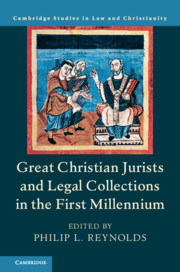Book contents
- Great Christian Jurists and Legal Collections in the First Millennium
- Law and Christianity
- Great Christian Jurists and Legal Collections in the First Millennium
- Copyright page
- Contents
- Contributors
- Preface and Acknowledgments
- Abbreviations
- Part I
- Part II
- 10 Lactantius
- 11 Ambrosiaster
- 12 Augustine of Hippo
- 13 Leo the Great
- 14 Gelasius I
- 15 Dionysius Exiguus
- 16 Benedict’s Rule
- 17 Gregory the Great
- 18 Isidore of Seville
- 19 Pseudo-Isidorus Mercator
- 20 Jonas of Orléans
- 21 Hincmar of Reims
- 22 Regino of Prüm
- 23 Burchard of Worms
- 24 New Horizons in Church Law
- Index
- References
23 - Burchard of Worms
from Part II
Published online by Cambridge University Press: 21 June 2019
- Great Christian Jurists and Legal Collections in the First Millennium
- Law and Christianity
- Great Christian Jurists and Legal Collections in the First Millennium
- Copyright page
- Contents
- Contributors
- Preface and Acknowledgments
- Abbreviations
- Part I
- Part II
- 10 Lactantius
- 11 Ambrosiaster
- 12 Augustine of Hippo
- 13 Leo the Great
- 14 Gelasius I
- 15 Dionysius Exiguus
- 16 Benedict’s Rule
- 17 Gregory the Great
- 18 Isidore of Seville
- 19 Pseudo-Isidorus Mercator
- 20 Jonas of Orléans
- 21 Hincmar of Reims
- 22 Regino of Prüm
- 23 Burchard of Worms
- 24 New Horizons in Church Law
- Index
- References
Summary
The Decretum of Burchard of Worms (d. 1025) was a popular and much copied canonical collection. Burchard drew on existing collections, which provided him with a mass of items that included conciliar decrees, patristic extracts, penitential prescriptions, and papal letters. He organized these into a coherent, relatively concise handbook designed for bishops to use in visitations and in their daily administrative lives. But he also intended his book to be used as a resource for teaching, as he explains in the preface. Coherence, clarity, and organization are the collection’s hallmarks. Whereas his predecessor, Regino, assumed that the reader would be able to derive an answer from multiple, sometimes conflicting texts, Burchard edited and assembled the texts to provide consistent, straightforward answers to a reader’s questions. The Decretum covers a wide range of topics that a bishop might need to address, including ritual, lay offenses, excommunication, penance, and even eschatology. Like Regino, Burchard sometimes forged new material, but for the most part he preferred to alter existing texts to make them consistent and to enhance their authority.
Keywords
- Type
- Chapter
- Information
- Publisher: Cambridge University PressPrint publication year: 2019

